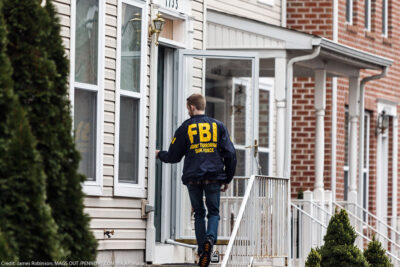
ACLU v. FBI - FOIA Case for FBI Records Related to Nondisclosure Agreements for Cell Site Simulators
What's at Stake
In 2021, the ACLU submitted a FOIA request to the FBI to determine whether the FBI has continued to require state and local law enforcement agencies to enter into nondisclosure agreements before purchasing or using cell site simulators. After appealing and suing, the ACLU finally obtained responsive records confirming that the FBI has continued to impose nondisclosure agreements on law enforcement agencies seeking to use the ąóµţ±ő’s cell site simulators.
Summary
Cell site simulators, also known as “Stingrays” or “IMSI catchers,” impersonate a wireless service provider’s cell tower, prompting cell phones and other wireless devices in the area to communicate with them. They can be used to locate, track, and identify people’s phones. Even when used to locate a particular suspect’s phone, cell site simulators collect unique numeric identifiers associated with all the phones in a given area, ensnaring bystanders’ phones in the search. Cell site simulators can also interfere with nearby cell phones’ connection to the cellular network.
For years, law enforcement agencies hid their use of cell site simulators from judges, defendants, lawmakers, and the public. Before state and local law enforcement agencies purchased cell site simulators from a private vendor, the FBI would require them to sign nondisclosure agreements (NDAs) prohibiting the disclosure of their use to the public and to the courts. The ACLU, journalists, and others obtained of the NDAs through public records requests, and the ąóµţ±ő’s secrecy policy was condemned by and .
In 2020, Dell Cameron and Dhruv Mehrotra published an revealing that, after a major provider of cell site simulators (L3Harris Technologies, formerly the Harris Corporation), announced it would no longer sell cell site simulators to state and local law enforcement, those agencies were turning to a different company, Tactical Support Equipment (TSE), which sells cell site simulators manufactured by Octasic, a Canadian firm. In 2021, the ACLU filed a Freedom of Information Act request seeking recent nondisclosure agreements between the FBI and state or local law enforcement agencies pertaining to that agency’s purchase, use, or possession of cell site simulator technology, including from TSE. Five months later, the FBI responded that it “neither confirms nor denies” the existence of such records (known as a “Glomar response”). It was not until the ACLU appealed the ąóµţ±ő’s Glomar response and filed a complaint in the Southern District of New York that the FBI finally agreed to produce responsive records.
Many of the records we received were created between 2011 and 2015, and offer additional examples of the FBI imposing nondisclosure agreements on state and local law enforcement agencies that sought to purchase or use cell cite simulators during that time. In the records we received that were created after 2018, there was nothing to suggest that the FBI has continued to impose nondisclosure agreements when state and local law enforcement agencies purchase their own cell site simulators. These records do reveal, however, that the FBI continues to impose nondisclosure agreements on agencies seeking to use the ąóµţ±ő’s cell site simulators. An FBI email from May 7, 2020, for example, states that individuals assigned to a particular investigation “read and acknowledged the ąóµţ±ő’s Nondisclosure agreement regarding the use of the cell site simulator.” And another email from May 14, 2020 relating to “a request for technical support” from the FBI under “exigent circumstances” provides recent NDA language. The recipient was asked to agree to several provisions, including:
- “The FBI must be contacted immediately if there is any request for, or intent to use publicly, any information relating to the assistance provided pursuant to this request;”
- “The FBI will use all appropriate legal means to limit testimony regarding the technology in any state or local proceeding;”
- “Information obtained through use of the equipment is FOR LEAD PURPOSES ONLY and may not be used as primary evidence in any affidavits, hearings, or trials;” and
- “[Y]our agency understands it is required to use additional and independent investigative means and methods . . . that would be admissible at trial to corroborate information concerning the location of the target obtained through use of this equipment.”
This is all purportedly justified by the assertion that “[t]he equipment to be deployed is considered [Law Enforcement Sensitive], as disclosure of the capabilities of this technology may allow future subjects of investigations to employ countermeasures to avoid detection by law enforcement.” But the public, courts, and people accused of crimes deserve to know when the government is deploying invasive surveillance technologies, and when the FBI is going to great lengths to keep that surveillance secret.
DOCUMENTS RELEASED UNDER THIS LAWSUIT
Released June 1, 2022
Released June 30, 2022
Released April 4, 2023
Negotiations between the ACLU and the FBI resulted in a supplemental production, in which the agency lifted certain prior redactions to a record released on June 1, 2022.
Legal Documents
-
12/15/2021
Complaint -
-
Exhibit A - FOIA Request -
Exhibit B - FBI Acknowledgement -
FBI Glomar Response -
Exhibit D - ACLU Glomar Appeal -
Exhibit E - FBI Appeal Acknowledgement
ACLU v. FBI - FOIA Case for FBI Records Related to Nondisclosure Agreements for Cell Site SimulatorsLegal DocumentsExhibit A - FOIA RequestCourt: Southern District of New York
Download DocumentACLU v. FBI - FOIA Case for FBI Records Related to Nondisclosure Agreements for Cell Site SimulatorsLegal DocumentsExhibit B - FBI AcknowledgementCourt: Southern District of New York
Download DocumentACLU v. FBI - FOIA Case for FBI Records Related to Nondisclosure Agreements for Cell Site SimulatorsLegal DocumentsFBI Glomar ResponseCourt: Southern District of New York
Download DocumentACLU v. FBI - FOIA Case for FBI Records Related to Nondisclosure Agreements for Cell Site SimulatorsLegal DocumentsExhibit D - ACLU Glomar AppealCourt: Southern District of New York
Download DocumentACLU v. FBI - FOIA Case for FBI Records Related to Nondisclosure Agreements for Cell Site SimulatorsLegal DocumentsExhibit E - FBI Appeal AcknowledgementCourt: Southern District of New York
Download Document -
-
01/19/2022
Answer to Complaint
Date Filed: 12/15/2021
Court: Southern District of New York
Download DocumentDate Filed: 01/19/2022
Court: Southern District of New York
Press Releases
New Records Detail How the FBI Pressures Police to Keep Use of Shady Phone Surveillance Technology a Secret
